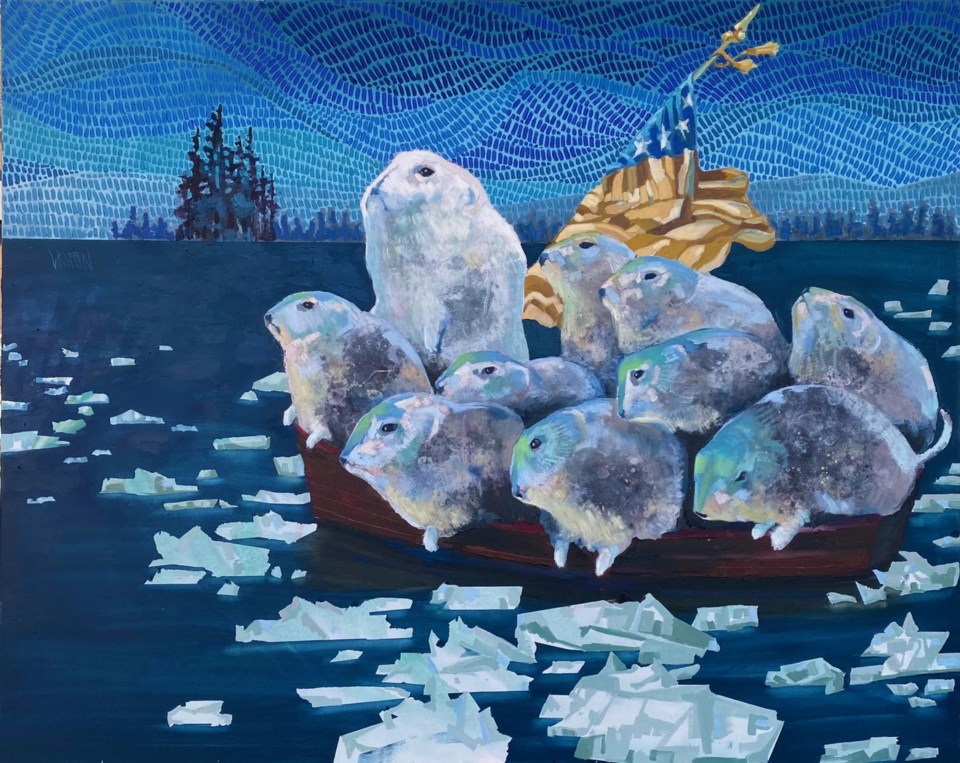CHARLOTTETOWN — The University of Prince Edward Island is backing away from a demand that an artist in residence take down a painting that the school said offended some American faculty members.
Christopher Griffin's painting, which was on display until Monday, shows lemmings gathered around an American flag as they cross an icy waterway, an image inspired by the iconic painting of George Washington crossing the Delaware River during the American Revolution.
Griffin said Thursday that he refused to remove the painting from the university's Atlantic Veterinary College in Charlottetown and instead quit the unpaid position because the school's administrators were censoring his work. He said school officials told him "a couple" American professors were unhappy with the painting, titled "The Crossing."
He said the artwork is intentionally political, but he insisted the university should welcome political discussions amid rising tensions between the United States and Canada, as U.S. President Donald Trump forges ahead with an international trade war and threatens to make Canada the 51st state.
"When the new U.S. administration came into power and was insulting and threatening Canada, like most Canadians, I was upset," Griffin said in an interview. "And as an artist, the way to express myself is through my work."
Late Thursday, university president Wendy Rogers sent Griffin an email offering him the opportunity to give a talk about his artwork and to show his paintings on campus, which the artist has agreed to do.
"I'll respond to this favourably," Griffin said. "It's not an apology or anything, but it is an offer to talk. It's an olive branch."
Griffin said he had offered to host a public discussion to explain his work, but the college initially declined.
"On the face of it, you could say it's an anti-American painting, it's a critical painting," he said earlier in the day. "But my intention was more of a lament for the United States. It wasn't meant to disrespect the American people or the American flag ... I did not want to be snarky or condescending."
He said he chose lemmings because of the myth that they commit mass suicide. "It reflects my bewilderment at the self-destructive policies of the American government at this time," he said.
Griffin noted that the revered painting of George Washington has been the subject of other reinterpretations that have been embraced by the American public.
"Shimomura Crossing the Delaware," for example, imagines what it would be like if Washington was Japanese American. The painting, which features samurai warriors instead of Continental soldiers, is part of the Smithsonian Institution's national portrait gallery in Washington, D.C.
In a statement posted on his website, Griffin said public universities have a duty to uphold "respectful discourse over censorship," particularly at a time when Canada's existence is under threat, a reference to Trump's stated goal of annexing Canada through "economic force."
"I expected some response because of the political climate we're in," Griffin said in the interview. "But I didn't expect the depth of the response .... For the most part, it's been very supportive."
In a statement referring to Griffin as the "former artist in residence," the university said a showing of his paintings would provide "an important opportunity for the university to explore freedom of expression and the role of art in a time of sociopolitical tension."
Griffin was the college's first artist in residence. When he was appointed last year, the college's dean noted that his work draws inspiration from the animal world, reflecting the focus of the veterinary school. “This initiative is an exciting opportunity to blend science and art, fostering a dynamic and inspiring environment at the college,” Dominique Griffon said in a November statement.
During his brief tenure, Griffin completed about a dozen works, most of them showing Canadian wildlife, including wild horses, polar bears and muskox.
But some of his more recent paintings took on a political tone. One of them shows a massive elephant with a tiny Canadian flag flying from atop a slender pole in the animal's back.
"It speaks to the size and power differential between us and the United States," Griffin said, noting that the elephant is a symbol of Trump's Republican party. "But the Canadian flag is flying proud and strong, small as it is."
This report by The Canadian Press was first published April 10, 2025.
— By Michael MacDonald in Halifax
The Canadian Press



